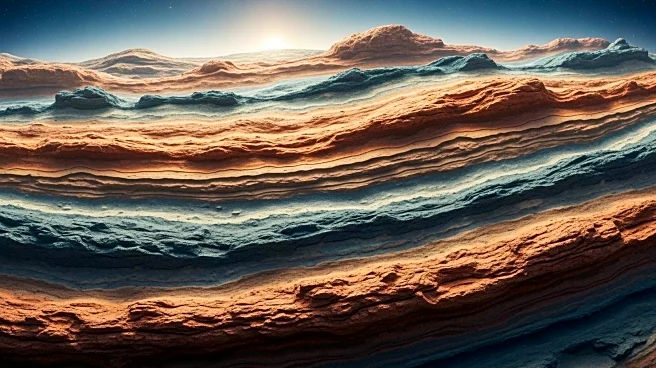What is the story about?
What's Happening?
Recent research suggests that Earth's continents began forming much earlier than previously thought, due to active crust recycling during the Hadean era. Scientists from Grenoble Alpes University, led by Adrien Vezinet, analyzed ancient magma pockets within olivine crystals and used computer models to simulate early Earth conditions. The study indicates that subduction, a process where one tectonic plate sinks beneath another, was active during the Hadean, contributing to rapid crust growth. This challenges the notion of a quiet early Earth and suggests a dynamic planet with active plate tectonics. The findings are based on geochemical analysis of melt inclusions from South Africa's Barberton Greenstone Belt, which preserve volcanic rocks over 3.2 billion years old. These inclusions revealed chemical fingerprints indicating significant crust formation and recycling during the Hadean.
Why It's Important?
The study's findings have significant implications for understanding Earth's geological history and the processes that shaped its surface. Early continent formation affects models of ancient climates, ocean chemistry, and the environments where life may have originated. The research suggests that Earth's mantle was more active than previously believed, with repeated subduction events contributing to the formation of continental crust. This challenges existing models of early Earth as a stagnant planet and highlights the importance of crust recycling in shaping the planet's surface. The study also provides insights into the conditions necessary for continent formation, which could inform research on other planets and their potential for supporting life.
What's Next?
Further research is needed to refine estimates of crust formation during the Hadean and to explore the implications for early Earth conditions. Scientists may continue to analyze ancient rocks and develop more sophisticated models to better understand the processes that shaped Earth's early surface. The study opens new avenues for investigating the role of tectonics in Earth's history and its impact on climate and life. Researchers may also explore similar processes on other planets to assess their potential for supporting life.
Beyond the Headlines
The study raises questions about the ethical and cultural implications of understanding Earth's early history. It challenges long-held assumptions about the planet's formation and highlights the importance of interdisciplinary research in uncovering new insights. The findings may influence how scientists approach the study of other planets and their potential for life, as well as the cultural narratives surrounding Earth's history.















